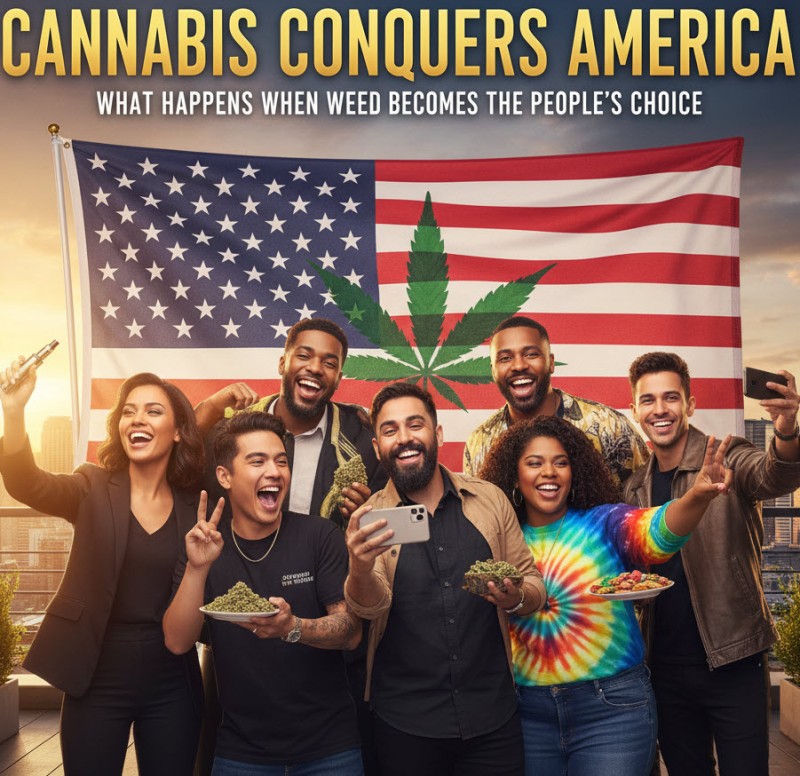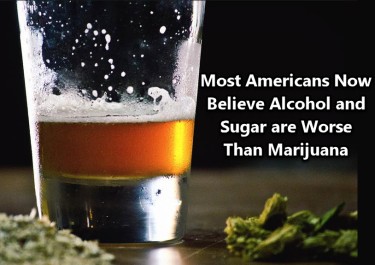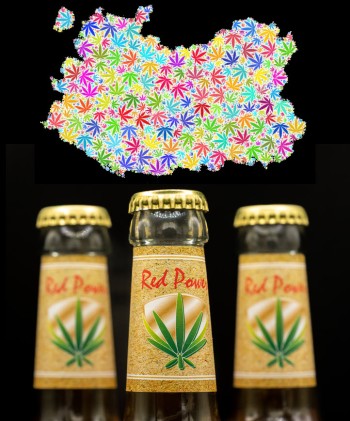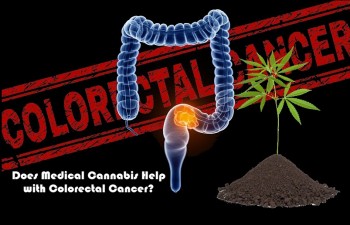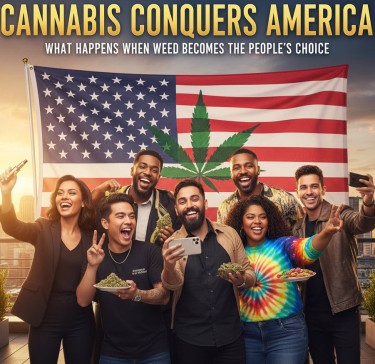
Something remarkable happened in America between 2021 and 2023, and most people didn't even notice. Cannabis surpassed cigarettes as the substance of choice for adult Americans. According to comprehensive research from SUNY and the University of Kentucky analyzing National Survey on Drug Use and Health data, cannabis-only use jumped from 7.2% to 10.6% of adults during that period, while cigarette-only use declined from 10.8% to 8.8%.
This isn't a minor shift. This is a fundamental transformation in what Americans choose to put in their bodies, how they alter their consciousness, and what substances define our social landscape. For the first time in modern history, more Americans are choosing a federally illegal plant over a legal, heavily taxed, and thoroughly normalized product that's been part of American culture since before the country existed.
The trajectory is even more dramatic when you zoom out. From 2015 to 2023, cannabis-only use nearly tripled from 3.9% to 10.6%, while cigarette-only use nearly halved from 15.0% to 8.8%. Gallup data confirms the trend: 15% of American adults now smoke cannabis, compared to just 11% who smoke cigarettes. Among young people, the gap widens—they're five times more likely to consume cannabis than tobacco.
This represents the most significant shift in American drug use patterns since Prohibition ended in 1933. We're witnessing a pharmacological realignment where millions of Americans are actively choosing cannabis over substances that have dominated for generations. The question isn't whether this shift is happening—it's what it means for our economy, our health, our social fabric, and our collective consciousness.
The Demographics: Who's Driving the Cannabis Revolution
The demographic breakdown reveals something fascinating about modern cannabis culture: it's not the stereotype of burnout stoners in their parents' basements. Cannabis users today are disproportionately college-educated, high-income, and privately insured—the exact opposite of cigarette smokers, who trend toward lower education, lower income, and lack of insurance.
This is a complete inversion of historical drug use patterns. For decades, substance use correlated with socioeconomic disadvantage. Cigarettes, alcohol, and harder drugs were associated with working-class communities, stress-coping mechanisms for those with fewer resources, and populations with limited access to healthcare and wellness alternatives.
Cannabis broke that pattern. The modern cannabis consumer is more likely to have a college degree, earn above median income, and work in professional settings. They're using cannabis intentionally—for stress relief, sleep enhancement, creative work, pain management, or simple recreational enjoyment—rather than as escapism from desperate circumstances.
This demographic shift reflects cannabis legalization's progression through affluent, educated states first. Colorado, Washington, California, Massachusetts—these aren't economically depressed regions. They're centers of education, technology, and progressive policy. As cannabis normalized in these areas, it became associated with health-conscious, informed consumers making deliberate choices rather than with dysfunction and poverty.
Young people are leading the charge. Being five times more likely to use cannabis than cigarettes, they're essentially rejecting tobacco entirely while embracing marijuana as their intoxicant of choice. This generation grew up with DARE programs warning about marijuana while watching states legalize it, seeing parents drink wine daily while clutching pearls about cannabis, and having access to information that revealed decades of prohibition propaganda as lies.
They chose the substance that their research indicated was safer, more enjoyable, and less culturally associated with disease and death. They watched grandparents die from cigarette-related illness and parents struggle with alcohol dependency, then made different choices. This isn't rebellion—it's rational consumer decision-making based on harm reduction.
The researchers noted that cannabis use increased "across nearly all sociodemographic groups" from 2015-2019, indicating this isn't confined to coastal elites or young professionals. Cannabis is becoming genuinely mainstream, crossing age, class, race, and geographic boundaries in ways that would have seemed impossible a decade ago.
The Economics: Following the Money as Markets Shift
The economic implications of this shift are staggering. The tobacco industry generates roughly $50 billion annually in the U.S., while the alcohol industry exceeds $250 billion. Both face existential threats as cannabis captures market share from their customer base.
The substitution effect is real and documented. Researchers observed that stable co-use rates—meaning people who use both cannabis and tobacco—suggest individuals are replacing cigarettes with cannabis rather than adding cannabis to existing habits. Similarly, separate research shows cannabis increasingly substitutes for alcohol consumption. This isn't market expansion; it's market capture.
Legal cannabis sales in the U.S. already exceed $30 billion annually and are projected to reach $50-60 billion by 2030. That money is coming from somewhere—specifically, from tobacco and alcohol budgets. Every dollar spent on cannabis is potentially a dollar not spent on cigarettes or alcohol, and the industries are feeling it.
Tobacco companies have responded by investing heavily in cannabis. Altria, maker of Marlboro, invested $1.8 billion in cannabis company Cronos. Constellation Brands, which owns Corona and Modelo, invested $4 billion in Canopy Growth. These aren't hedges—these are desperate pivots by industries watching their customer base evaporate toward a competitor they can't legally crush due to federal prohibition.
The tax implications are equally significant. States are generating billions in cannabis tax revenue—California alone collected over $1 billion in 2023. As cannabis replaces cigarettes and alcohol, state budgets dependent on sin taxes face revenue reallocation. Some states will win (those with robust legal cannabis markets), while others will lose (those maintaining prohibition while their residents purchase from neighboring legal states).
Employment is shifting too. The legal cannabis industry employs over 400,000 people in cultivation, processing, retail, testing, and ancillary businesses. As the industry grows and tobacco declines, we're seeing a generational workforce transition from cigarette manufacturing and distribution toward cannabis operations.
The pharmaceutical industry faces disruption as well. Cannabis increasingly substitutes for prescription medications—opioids for pain, benzodiazepines for anxiety, sleep medications, anti-inflammatory drugs. Research confirms medical cannabis legalization correlates with reduced opioid prescriptions and overdose deaths. Every patient managing pain with cannabis instead of OxyContin represents lost pharmaceutical revenue.
The economic winners are clear: cannabis cultivators, processors, retailers, testing labs, ancillary businesses, legal states collecting tax revenue, and consumers enjoying a safer, more effective product at competitive prices. The losers: tobacco companies, alcohol corporations, pharmaceutical firms, private prisons dependent on drug war funding, and law enforcement agencies losing asset forfeiture revenue.
The Health Equation: Comparing the Damage
Let's be direct about relative harms. Tobacco kills approximately 480,000 Americans annually through cancer, heart disease, stroke, and respiratory illness. Alcohol kills roughly 140,000 through liver disease, accidents, violence, and overdose. Cannabis has never caused a fatal overdose in recorded human history.
This doesn't mean cannabis is harmless. Smoking anything introduces combustion byproducts into your lungs. Heavy cannabis use can impair cognitive function, particularly in developing brains. Cannabis use disorder is real, though far less common and severe than nicotine or alcohol addiction. Impaired driving is dangerous regardless of substance.
But the comparison isn't close. On virtually every health metric—cancer risk, organ damage, addiction potential, overdose risk, societal harm—cannabis is dramatically safer than tobacco and alcohol. If Americans are substituting cannabis for cigarettes and alcohol, public health outcomes will improve significantly.
The researchers who conducted the SUNY/Kentucky study suggested cannabis could become "the next public health crisis," but this framing is absurd. We already have public health crises—they're called tobacco and alcohol. Cannabis replacing those substances isn't a crisis; it's harm reduction at a national scale.
Consider what happens if current trends continue. If cigarette use drops to 5% while cannabis rises to 20% over the next decade, we're looking at potentially hundreds of thousands fewer annual deaths from smoking-related illness. If alcohol consumption declines as people substitute cannabis, we're looking at reduced drunk driving fatalities, domestic violence, liver disease, and alcohol poisoning deaths.
This isn't speculation—it's following the harm reduction logic that public health officials claim to support. Yet many researchers and policymakers resist acknowledging that cannabis normalization might actually improve population health outcomes compared to the tobacco-and-alcohol status quo.
The Social Question: What Happens to a Stoned Nation?
Here's where we enter fascinating, uncertain territory. What happens to American culture, politics, and social consciousness when cannabis becomes the dominant recreational substance?
Cannabis affects consciousness differently than alcohol. Alcohol is a disinhibitor—it removes filters, increases aggression, impairs judgment, and facilitates violence. Cannabis is generally the opposite: it increases introspection, reduces aggression, enhances sensory perception, and promotes contemplation over action.
A nation that drinks is a nation comfortable with aggression, dominance, and unreflective confidence. A nation that smokes might become more introspective, questioning, and resistant to simple narratives. This could manifest as reduced authority-seeking behavior—people questioning government narratives, challenging institutional power, and rejecting top-down control.
Or it could create complacency. Cannabis can make people content with suboptimal circumstances, satisfied to observe rather than act, willing to accept status quo because hey, at least they've got weed. The question of whether cannabis creates revolutionaries or pacifies potential rebels has no clear answer.
Historical precedent doesn't help much. Cannabis has been used by activists and artists driving social change, but also by people checking out of civic engagement entirely. The substance doesn't determine the outcome—context, culture, and individual choice do.
What we can observe is that cannabis users tend toward certain values: personal freedom, skepticism of prohibition, support for drug policy reform, and resistance to authoritarian drug enforcement. Whether this translates to broader anti-authoritarian politics or remains confined to cannabis-specific issues remains unclear.
There's also the cognitive question. Does widespread cannabis use affect how Americans think, process information, and engage with complex problems? Some research suggests cannabis enhances creative thinking and novel problem-solving. Other research shows it can impair working memory and executive function, particularly with heavy use.
At a population level, we're conducting a natural experiment. Over the next decade, as cannabis use potentially doubles and tobacco use halves, we'll see whether American society becomes more creative and introspective or more complacent and cognitively impaired. My suspicion is we'll see both—different effects in different populations using different amounts in different contexts.
The Sticky Bottom Line: Embracing Uncertainty
Cannabis has become America's drug of choice, overtaking cigarettes and rising toward alcohol-level prevalence. The demographic profile skews educated and affluent. The economic implications are massive, disrupting tobacco, alcohol, and pharmaceutical industries while creating entirely new markets. The health outcomes are almost certainly positive compared to substances being replaced.
The social and cognitive impacts? We're figuring that out in real time. Will cannabis make Americans more questioning of authority or more accepting of the status quo? More creative or more complacent? More introspective or more checked-out?
Who knows. That's not a cop-out—it's acknowledgment that we're in unprecedented territory. Never before has a society conducted this large-scale a shift in consciousness-altering substance preferences. The outcomes will emerge over decades, shaped by policy choices, cultural evolution, and millions of individual decisions about how and why to use cannabis.
What I know is this: Americans chose cannabis over cigarettes despite federal prohibition, decades of propaganda, and social stigma. They chose it because it works better for their needs, causes less harm, and aligns better with their values. That's bottom-up cultural change that no amount of government prohibition or corporate resistance can reverse.
Cannabis won because people preferred it. Now we get to discover what that preference means for who we become as a society. I'm optimistic, but I'm also honest: we don't know yet. The experiment is underway, the results aren't in, and the implications remain uncertain. What's certain is that there's no going back. Cannabis is here, it's normalized, and it's reshaping America whether the authorities like it or not.
